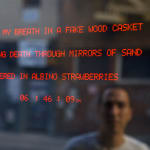Yucef Merhi Venezuelan, b. 1977
The Poetic Clock 2.0, 2000
computer, custom software, 4K LED TV
37.5 x 66 in.
Edition of 5 plus 1 artist's proof
Copyright The Artist
The Poetic Clock 2.0 is a digital clock that transforms time into poetry and generates 86,400 different poems every day. It is comprised of four rows of text. The first...
The Poetic Clock 2.0 is a digital clock that transforms time into poetry and generates 86,400 different poems every day. It is comprised of four rows of text. The first line of verse changes with every hour. The second line of verse changes with every minute. The third line of verse changes with every second. Finally, the fourth line shows the hour as HH:MM:SS. The reading of the three verses produces an articulated and coherent poem; a poem that mutates each second, minute, and hour, a poem that is continuously becoming another of itself, displaying through language the movement of time. Therefore, the clock produces no more and no less than 86,400 poems every single day.
Between 1997 and 2000, an electronic version of The Poetic Clock was shown in museums and exhibition spaces in Venezuela, Mexico, Brazil, and the United States. Then in 2000, following the premises set by Nicholas Negroponte regarding the conversion from atoms to bits, Merhi programmed a software that emulates the same process of the machine but displaying the result as a real-time video. This translation from hardware to software facilitated the preservation, reproduction, transportation, and exhibition of the work
Between 1997 and 2000, an electronic version of The Poetic Clock was shown in museums and exhibition spaces in Venezuela, Mexico, Brazil, and the United States. Then in 2000, following the premises set by Nicholas Negroponte regarding the conversion from atoms to bits, Merhi programmed a software that emulates the same process of the machine but displaying the result as a real-time video. This translation from hardware to software facilitated the preservation, reproduction, transportation, and exhibition of the work




